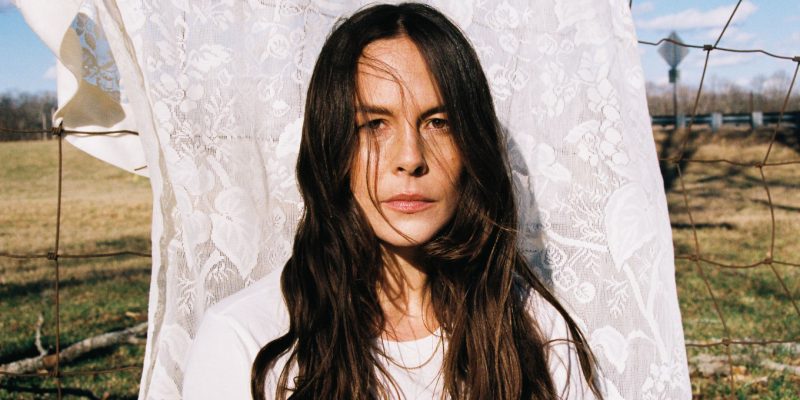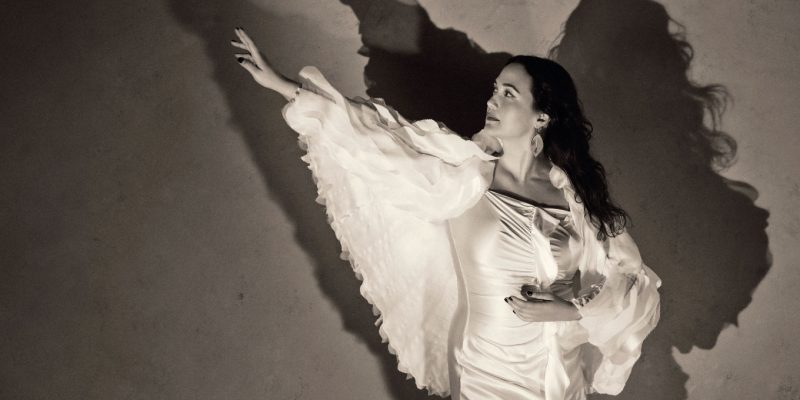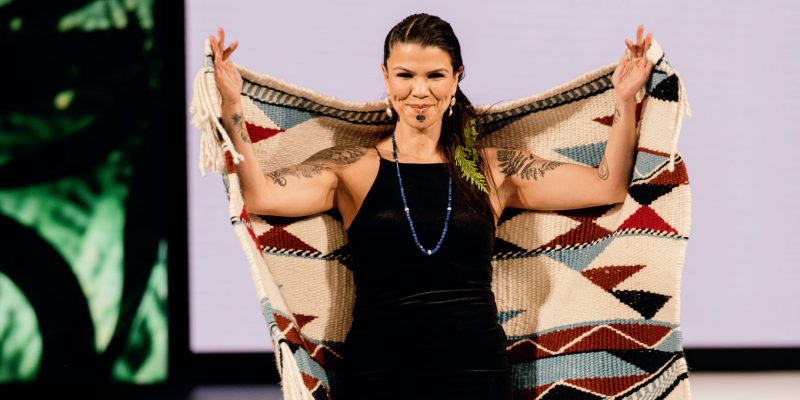Society
Watch Chika Oriuwa's Moving Valedictorian Speech
Oriuwa was the only Black student in her graduating class at the University of Toronto's faculty of medicine.
by : Hannah Ziegler- Jun 3rd, 2020
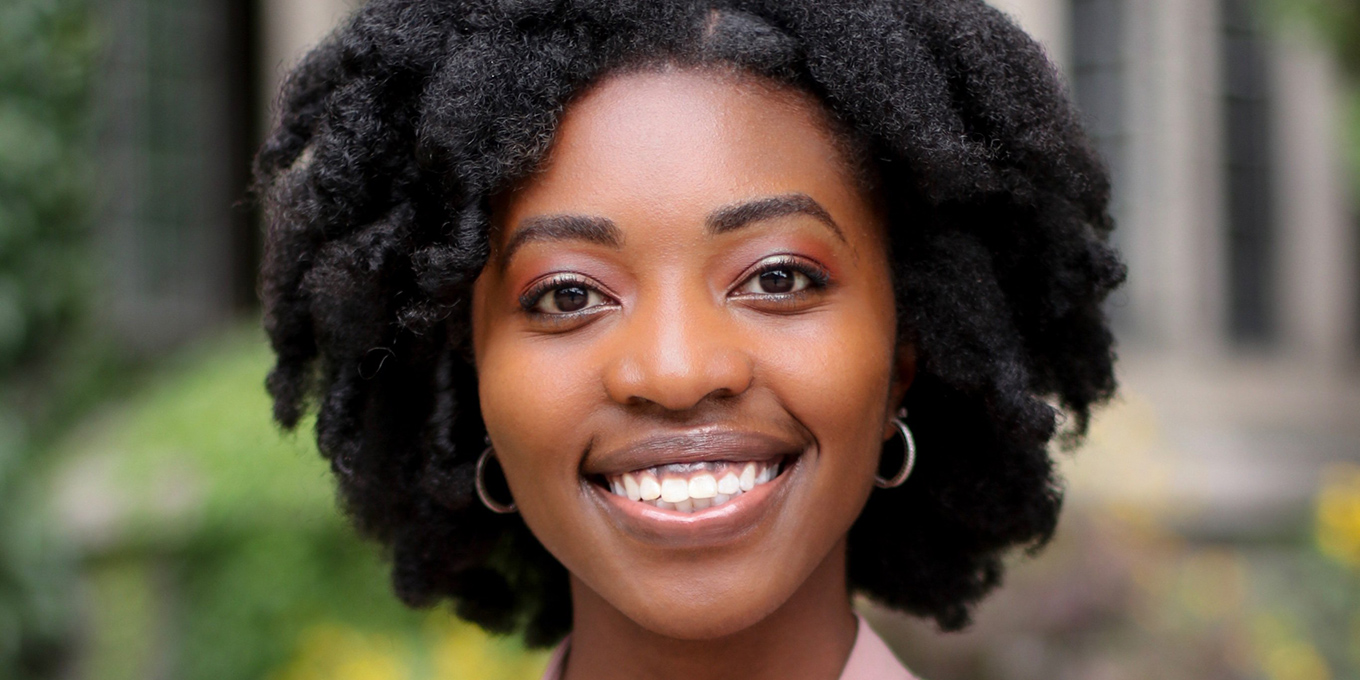
Yesterday, Chika Oriuwa, a graduating student at University of Toronto’s faculty of medicine, made history as the second Black woman to be chosen as the medical school’s valedictorian – and the first woman to hold the title in 14 years. Oriuwa was the only Black student in her graduating class of 259 people.
“One of my earliest defining moments was a few years before I started medical school, when a border officer accused me of lying about having aspirations of becoming a physician,” said Oriuwa in her commencement speech, which was delivered via pre-recorded video due to the coronavirus pandemic. “His words stayed with me for years, as I faced invalidations about my experience as a woman of colour in medicine.”
She continued: “I remembered his words when a patient asked me to leave because they could not believe that the only Black person in the room was also training to become a doctor. I did not want my story to be written by others; I did not want to be inaccurately defined on my own journey and knew that I had to reclaim my narrative.”
Oriuwa also addressed the pandemic and the recent racial injustices across North America in her speech. “Those with the foresight to define themselves in the world, who raise their arms with fists curled in the face of injustice, as our patients entrust us with their lives, the time has officially arrived for us to rise to the occasion,” she told the class of 2020.
Prime Minister Justin Trudeau extended his congratulations to Oriuwa via Twitter. “Congratulations!,” he tweeted. “Your voice, your talents, and your passion are needed now more than ever. Enjoy this moment – and all the best to you and your fellow @UofTMedicine graduates in the years to come. This is only the beginning of an incredible journey, I’m sure. #UofTGrad20″
Congratulations! Your voice, your talents, and your passion are needed now more than ever. Enjoy this moment – and all the best to you and your fellow @UofTMedicine graduates in the years to come. This is only the beginning of an incredible journey, I’m sure. #UofTGrad20 https://t.co/QCTKi5Ci2v
— Justin Trudeau (@JustinTrudeau) June 2, 2020
Watch the entire speech and find a full transcription below.
Good Morning,
Dean Young, Vice Dean Houston, esteemed professors, physicians and faculty members, mentors, family, friends, and especially my fellow graduating class of physicians at the University of Toronto, faculty of medicine, class of 2020.
I am Chika Stacy Oriuwa, and I have the absolute honour of being the valedictorian of our graduating class here at U of T. I’d like to start by thanking you, to my fellow graduates for the opportunity to share my address, during what will be the final time that we convene before our respective journeys take flight.
I’d like to start by addressing the elephant in the room. Whether you’re watching this speech from the comfort of your bed, or around the dining room table with your family, I’m sure that we all envisioned the day we finally became medical doctors to look and feel a little differently than it does right now. If I may, I’d like to take a moment to reflect on what it means to be a doctor.
As physicians, we are asked to make sense of our patients’ stories. Rarely does a patient present to us with a clinical picture that fits beautifully with what appears in our textbooks.
We are often called to synthesize complex information into a coherent narrative to formulate a differential diagnosis and approach to treatment. We are asked to make sense of the difficulty in our patients’ lives; we are, in essence, sense-makers.
But what do we do when it stops making sense? When the patient who has been stable for years relapses, when the psychosis returns, or when the cancer metastasizes? What do we do when things don’t go as planned and we are no longer the sense-makers?
In these moments, we should remember that the most important skill that we possess is not our ability to make sense of things, but our ability to connect, remain human, and bring comfort. Or as Hippocrates is thought to have said, “Cure sometimes, treat often, comfort always.”
It is my hope that in sharing my parting words, I am able to instill in us a measure of comfort despite the unexpected turn.
When we envisioned our graduation day, we expected to don our caps and gowns, walk confidently across the stage to get our degrees in Convocation Hall, while our friends and families cheer through our names being called after being reminded by the faculty to hold their applause until the end.
We live for those moments of unbridled joy, and to bask in the pride of completion and accomplishment.
But things didn’t go as planned. And while I know it feels a little different, a little incomplete, I say that today it is still our day. On this day, we become doctors, and, non-traditional celebration and all, this achievement is a momentous one.
One of my personal heroes is the former First Lady of the United States, Michelle Obama. In her memoir, she wrote, “If you don’t get out there and define yourself, you’ll be quickly and inaccurately defined by others.”
And so, as we pause to reflect on the past four years and ponder the next, perhaps we should ask how we have defined ourselves and how we will continue to do so as physicians in this world?
Reflexively, from our time in Portfolio [a course centred on personal and small-group reflection], I know many of us are itching to say that we’ll be a scholar, communicator, and health expert, but for one moment, let’s step back, put away our Portfolio submissions, and take a minute to really think about it.
Four years ago we were the stem cells in the Foundations [a new pre-clerkship curriculum introduced at U of T in 2016] Petri dish.
We started our medical education at the same institution where Banting and Best discovered insulin, and where we discovered how to learn; about ourselves, medicine, and the ever-changing world around us. We confronted our mistakes, failures, and setbacks. We leaned into what sparked our interests and what coaxed the flames of our passion.
We displayed an insatiable curiosity for knowledge, and a commitment to learning. We prepared for mastery exams every few weeks, and despite the sheer exhaustion, were able to find comedic relief in the form of brilliantly crafted memes for every situation in which we found ourselves.
I can confidently say that we laughed as much as we learned, and we cared for each other, and that is how we got through the last four years. We shared our notes, our artistic talents, our secrets, our frustrations, our disbelief, our joys, and our tragedies.
We mourned upon learning of the passing of one of our own, Ashley Ma, while coming together and finding a way to keep strong, keep her memory alive, and keep moving forward.
When we hit the wards in 2018, we were eager clinical clerks, ready to take care of our patients, leave a lasting impression on preceptors, and apply the knowledge that we accrued.
With a pager in one hand, and a stethoscope in the other, we stood tall, and ready to face any obstacles that clerkship may throw at us, including the dreaded first time we had to percuss a lung base in front of our preceptor.
We learned about the fragility of life, as we ushered it into this world, and held its hand on the way out. We sat with patients as we delivered terminal diagnoses, and parents as they heard their child’s heartbeat for the first time.
On many occasions, we stayed awake for 30-hour stretches, and at points broke down when the weight of expectations, exhaustion, and uncertainty proved too heavy to bear. It was in these circumstances that we found each other, and came together, like we always have.
These moments defined our clerkship, but how have we defined ourselves along the way?
My journey through medical school has been unconventional. It has been an iterative process of being inaccurately defined by others and having to continuously redefine myself.
When I started medical school four years ago, I was surprised to find that in a class of 259, I stood as the sole Black student. And despite taking immense pride in being a woman of colour in a space where we are often unseen, I could not have imagined the extent to which my identity and story would be the driving force of my advocacy and the platform upon which I strove for change.
One of my earliest defining moments was a few years before I started medical school, when a border officer accused me of lying about having aspirations of becoming a physician. His words stayed with me for years, as I faced invalidations about my experience as a woman of colour in medicine.
I remembered his words when a patient asked me to leave because they could not believe that the only Black person in the room was also training to become a doctor. I did not want my story to be written by others; I did not want to be inaccurately defined on my own journey and knew that I had to reclaim my narrative.
In my first year of medicine, I was presented with the opportunity to be the ambassador of the Black Students Application Program at U of T—an initiative developed by the faculty in partnership with the Black community in response to the chronically low number of Black students admitted to the program.
However, this also meant going public with my experiences of isolation and encountering discrimination. I knew that I was uniquely positioned to speak truthfully on this issue.
But I was worried—actually, I was terrified.
I was cautioned that institutions do not like people who challenge the status quo, that I could be jeopardizing a spot in residency, or future career opportunities. For me, there was an ever-present tension between my advocacy and my wanting to be accepted.
I mention this because I want to challenge the notion that being an advocate, and living in your authentic truth, is mutually exclusive from belonging.
Through seeking counsel with mentors, families, and friends, I was empowered to move forward, and stand by my conviction to enhance diversity and inclusive practices within medicine and beyond. These decisions, which may seem trivial in hindsight but were terrifying at the time, are the moments by which I now define myself.
When I wrote my first syndicated article detailing my experiences and ideas for reform, I faced an onslaught of online bigotry, threats, and racism. Without missing a beat, my classmates were there to defend me, stand alongside me as allies, and shoulder me as I continued my advocacy.
When I was providing a seminar, I had a resident comment that although they admired my bravery and voice, they would have never done what I was doing, because it was too risky, and they didn’t think the system would be accepting of what I had to say. It was then that I was reminded by my mentors that there was a greater risk in staying silent; advocacy was a form of self-preservation when there are no other options.
When I gave my keynote speech at Women’s College Hospital on International Women’s Day in 2018, as I looked out to a sea of mostly strangers, I saw several seats occupied by my fellow classmates, and the familiar smiles emboldened me to speak confidently. On a journey that has been marked by moments of otherness, I learned that I belong in this incredible, protective family we call 2T0s.
So, to answer my own question, I defined myself in the last four years through understanding and hopefully demonstrating that there is a power in narrative and in vulnerability. With a community to stand behind you, and a mentor to guide you, you can take the risk that might move mountains.
And I have witnessed many of my classmates do the same. Between Adam taking the front page in the newspaper as a medical student working in the same hospital where he was once a premature baby fighting for his life, to Justine winning a national student scholarship in family medicine, Nayantara, Justin, and Liz producing and directing Daffydil the musical, procuring PPE for frontline workers during a pandemic, and achieving their life-long goals and dreams.
I’ve learned that if it takes a village to raise a child, it takes a nation to train a doctor. So for this, I want to take a moment to thank those without whom, we would not be here today.
First, I would like to thank our loved ones for supporting us on the path to medicine, believing in our dreams, encouraging us when we felt defeated, and celebrating our wins. Thank you for being our anchors, that grounded us in who we were, when we often lost sight of the bigger picture.
To our patients, thank you for trusting us to heal you, learn medicine through you, and patiently tolerating us attempting to elicit the brachioradialis reflex for the fifth time. You have taught us more about life than we ever could have imagined in these four years.
To our faculty, staff, and preceptors, thank you for being our lighthouse when the choppy waves of medicine carried us far from the shore. For creating an inclusive environment where we can learn without judgment and explore our curiosity without reservation.
You have been there to not only support our education, but also help us find meaning throughout the journey, and you guided us to the specialty that we will now call home. Our gratitude to all of you is endless.
So, to my fellow graduates:
To this cohort of brilliant physicians with boundless potential
To the people who are quickest at thinking of a differential
Who have finally earned the credential of M.D.
We had a vision of 2020,
though the picture didn’t quite come out as clear as we thought it would be
We remained a class of visionaries.
Those with the foresight to define themselves in the world
Who raise their arms with fists curled in the face of injustice
As our patients entrust us with their lives,
The time has officially arrived for us to rise to the occasion
So here is to the stem cells
The first generation to graduate from the curriculum of Foundations
We waded into uncertain waters
The sons and daughters of hope.
Equipped with knowledge, compassion, and our stethoscopes
We now find ourselves, four years later
Starting residency in the face of an uncertainty that is much greater
Once again, wading into unchartered territory
Maybe, it’s a defining part of our story
To be the class who is familiar
With moving forward despite the unknown
We have shown,
that are capable of doing what has not been done before
We are the class who will explore the stones yet turned
Here is to the innovators, way-makers, and healers,
Who have been mentored by some of the greatest leaders in medicine
At an institution that continues to re-define excellence
We are ready to take the leap into the next chapter of our lives
And on the other side awaits personal and professional celebration
Anniversaries, weddings
Rare diagnoses and successful resuscitations
And though we will encounter a difficult road ahead,
We are united by the threads of endurance and tenacity
Within us lies the capacity to change the world
To my fellow graduates of the university of Toronto, Faculty of Medicine, Class of 2020, congratulations! We did it!
Thank you for this incredible honour, and I look forward to seeing how our journeys unfold.
READ MORE:
The Conversation About Racism All Canadians Need To Hear
Newsletter
Join our mailing list for the latest and biggest in fashion trends, beauty, culture and celebrity.
More from Society
Read Next

Beauty
The Best Met Gala Beauty Looks Of All Time
From Taylor Swift's 'Bleachella' era to Rihanna's iconic 2011 braids, meet the best beauty moments in Met Gala history.
by : Katie Withington- Apr 26th, 2024
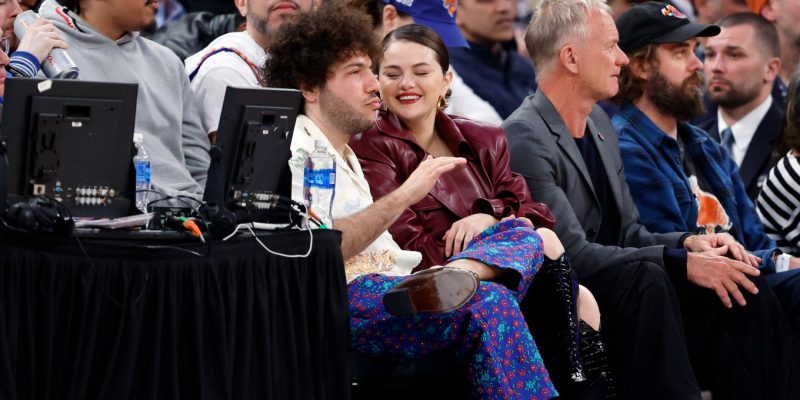
Culture
Benny Blanco Says He Fell in Love With Selena Gomez Without ‘Even Noticing’ It
Allow Benny Blanco to tell the straight-from-a-rom-com story of how he realized his feelings for his girlfriend and longtime friend.
by : Alyssa Bailey- Apr 26th, 2024

Beauty
Summer Prep: How to Feel Confident in Your Swimsuit
New Size-Inclusive Swimwear: Gillette Venus partners with The Saltwater Collective to Launch a Collection for Any Body
by : ELLE Canada- Apr 24th, 2024

